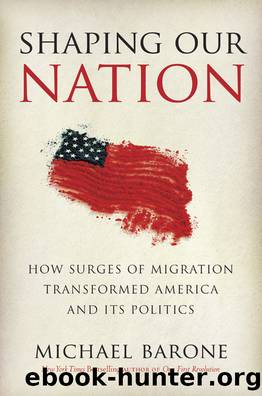Shaping Our Nation by Michael Barone

Author:Michael Barone [Barone, Michael]
Language: eng
Format: epub
ISBN: 978-0-307-46153-7
Publisher: The Crown Publishing Group
Published: 2013-10-01T00:00:00+00:00
THE end of the Civil War in 1865 came seventy-six years after the inauguration of George Washington as the first president and seventy-six years before the declaration of war following the attack on Pearl Harbor. This book has depicted the Civil War as a clash between surges of migration, an irrepressible or at least not repressed conflict between the surging Yankee diaspora and the southern grandees, with the Scots-Irish, after their southwestward surge was spent, split between the two sides, with the surging Germans taking the side of the Yankees and the surging Irish more ambivalentâperspectives at variance with usual depictions of the war.
The result was what might be called the Yankee conquest of North America, but a conquest that was less than total. Reconstruction, the efforts to defend the rights of blacks in the South, failed when the prospect of perpetual military deployment there was rejected by the voters. The surge of westward Yankee migration from New England was largely spent after two generations. Expansion into the increasingly arid farmlands of the Great Plains was limited, as was expansion to the still very lightly settled Pacific coast. But in their postsurge period, Yankees took undisputed leadership of American culture, in the growing universities and in literature, where Mark Twain, raised in a southern-origin part of Missouri, embodied the Yankee outlook as much as the editors of high-culture publications in Boston and New York did. Very successful Yankees exploited a network of elite secondary schools and colleges that served as a preparatory ground for public leadership. Abraham Lincoln sent his son Robert to Phillips Exeter Academy and Harvard in the midst of the Civil War; Franklin Roosevelt went to Groton, headed by the Reverend Endicott Peabody, and Harvard; Samuel Bush, a steel manufacturer in Columbus, Ohio, chose Phillips Andover Academy and Yale for his son Prescott Bush, father and grandfather of presidents. Yankees rose to the top in investment banks and in law firms: making up the WASP (white Anglo-Saxon Protestant) elite, as it came to be called in the 1970s, just as its dominance of the upper ranks of society was waning.
The Union victory in the Civil War ended not only the southern grandeesâ surge of expansion; the abolition of slavery cost them most of their wealth, and their land was worth less than before since they couldnât use gang-system cultivation to maximize the production of cotton. And the efforts of Republicans in the Reconstruction Congresses and Ulysses S. Grantâs administration to enforce equal rights, including voting rights for blacks in the South, by military force threatened their political dominance. Southern whites fought Reconstruction with violence and succeeded in ending military occupation. Over three decades they set fully in place a system of legal segregation and an informal but even more effective regime of violent intimidation. This âNew South,â as publicists hailed it, fell farther and farther behind the North economically and remained largely apart from it culturally. It is as if it walled itself off from the nation it fought to leave.
Download
This site does not store any files on its server. We only index and link to content provided by other sites. Please contact the content providers to delete copyright contents if any and email us, we'll remove relevant links or contents immediately.
Cecilia; Or, Memoirs of an Heiress — Volume 1 by Fanny Burney(32523)
Cecilia; Or, Memoirs of an Heiress — Volume 2 by Fanny Burney(31928)
Cecilia; Or, Memoirs of an Heiress — Volume 3 by Fanny Burney(31912)
The Great Music City by Andrea Baker(31894)
We're Going to Need More Wine by Gabrielle Union(19019)
All the Missing Girls by Megan Miranda(15881)
Pimp by Iceberg Slim(14461)
Bombshells: Glamour Girls of a Lifetime by Sullivan Steve(14036)
For the Love of Europe by Rick Steves(13792)
Talking to Strangers by Malcolm Gladwell(13327)
Norse Mythology by Gaiman Neil(13312)
Fifty Shades Freed by E L James(13214)
Mindhunter: Inside the FBI's Elite Serial Crime Unit by John E. Douglas & Mark Olshaker(9283)
Crazy Rich Asians by Kevin Kwan(9256)
The Lost Art of Listening by Michael P. Nichols(7475)
Enlightenment Now: The Case for Reason, Science, Humanism, and Progress by Steven Pinker(7287)
The Four Agreements by Don Miguel Ruiz(6726)
Bad Blood by John Carreyrou(6597)
Weapons of Math Destruction by Cathy O'Neil(6243)
